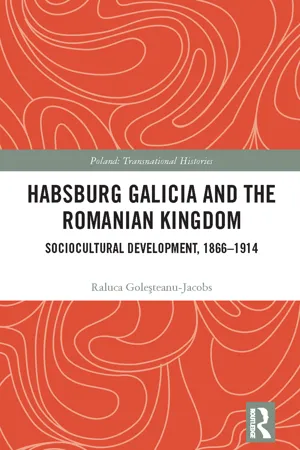
Habsburg Galicia and the Romanian Kingdom
Sociocultural Development, 1866–1914
- 336 pages
- English
- ePUB (mobile friendly)
- Available on iOS & Android
Habsburg Galicia and the Romanian Kingdom
Sociocultural Development, 1866–1914
About this book
This comparative attempt, intended for postgraduates and scholars of Eastern-Central Europe, investigates the political, economic, and cultural landscape of Habsburg Galicia and the Romanian Kingdom in the second half of the 19th century. Often, in historiography and in the public sphere alike, the two cases under study have been separately regarded as contexts that provided atypical answers to modernity, and parts of a region that has been regarded as atypical in itself.
Recently, efforts have been made to integrate each of the cases in a post-imperial paradigm, identifying the complex interactions between their socio-political modernisation and historical memory. This book continues this trend by investigating for the first time the two cases together, as parts of a space of alterity, as labs of shifting ideologies and labels.
The public figures and the institutions depicted in the book are physically located in Central and in Eastern Europe, but by sometimes competing experiences they are illustrative for several identities and historical realms, local, regional, and continental. Secondly, the current work addresses dilemmas related to Nationalism and nation building, for the sake of separating those discourses which reflected on civic nationalism from those which directed the public mind to the values of ethnic nationalism.
Frequently asked questions
- Essential is ideal for learners and professionals who enjoy exploring a wide range of subjects. Access the Essential Library with 800,000+ trusted titles and best-sellers across business, personal growth, and the humanities. Includes unlimited reading time and Standard Read Aloud voice.
- Complete: Perfect for advanced learners and researchers needing full, unrestricted access. Unlock 1.4M+ books across hundreds of subjects, including academic and specialized titles. The Complete Plan also includes advanced features like Premium Read Aloud and Research Assistant.
Please note we cannot support devices running on iOS 13 and Android 7 or earlier. Learn more about using the app.
Information
Table of contents
- Cover
- Half Title
- Series
- Title
- Copyright
- Dedication
- Contents
- Acknowledgements
- Notes on spelling, the meaning associated to some words, the use of capital letters, the nature and profile of the employed resources
- Introduction
- Part 1 Methods
- Part 2 Contexts
- Part 3 Ideas
- Conclusions
- Bibliography
- Index